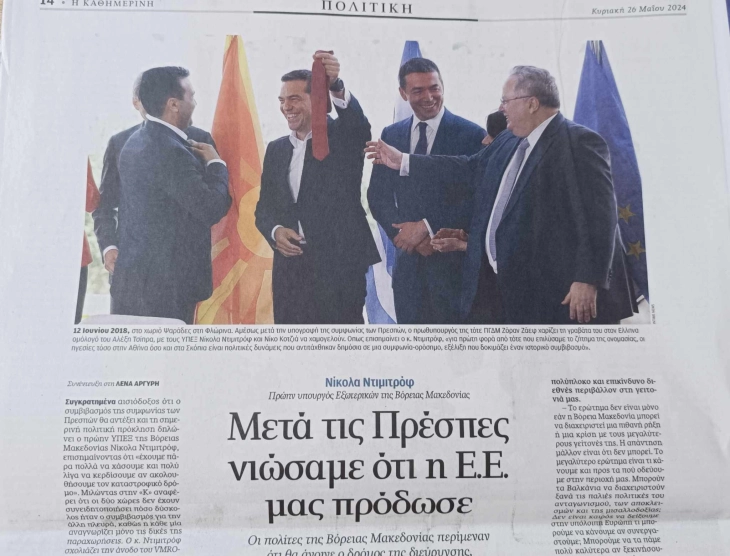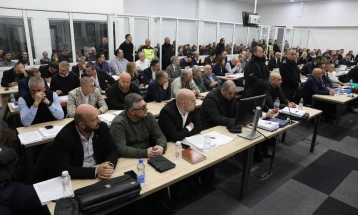Dimitrov for Kathimerini: Good that New Democracy, VMRO-DPMNE don't intend to destroy bridge we put so much effort into building
- It is good that New Democracy or VMRO-DPMNE do not intend to demolish the bridge the previous governments built with so much effort, former Minister of Foreign Affairs Nikola Dimitrov told Kathimerini, pointing out that citizens felt betrayed that the EU, after the Prespa Agreement, failed to keep its promise to start accession talks with North Macedonia because "Bulgaria took over the veto baton," MIA's Athens correspondent reports.
- Post By Magdalena Reed
- 17:31, 26 May, 2024

Athens, 26 May 2024 (MIA) — It is good that New Democracy or VMRO-DPMNE do not intend to demolish the bridge the previous governments built with so much effort, former Minister of Foreign Affairs Nikola Dimitrov told Kathimerini, pointing out that citizens felt betrayed that the EU, after the Prespa Agreement, failed to keep its promise to start accession talks with North Macedonia because "Bulgaria took over the veto baton," MIA's Athens correspondent reports.
In the interview for the Sunday edition of the paper, North Macedonia's former foreign minister talked about the current situation in the bilateral relations with Greece. He noted that for the first time since the name issue was resolved, the parties that were against the Prespa Agreement at the time were in power in both Skopje and Athens. He also said that during his political career, he had learned "to fully understand the concerns and sensitivities of both sides."
"It is impressive how little they are aware, in both Greece and North Macedonia, of how difficult the compromise was for the other side. Each side is aware only of its own concessions. It is good that neither New Democracy nor VMRO-DPMNE have any intentions of destroying the bridge we built with so much effort. Both sides are enjoying the benefits of the agreement while at the same time blaming their predecessors for the perceived flaws," Dimitrov said.
"However," he added, "without care and maintenance, the bridge can get damaged. The key ingredient here is responsible leadership, with the goal of bringing the two realities closer."

According to the name deal provisions, Dimitrov said, any disagreements should be addressed through negotiations, meetings, and an open exchange of opinions in private instead of through public statements.
However, he said, despite "failings in the implementation of the agreement on both sides, the compromise works." He expressed optimism that "the compromise will stand the test of this political challenge as well."
On whether the new government would be able to make any progress in EU integration, he said it would depend on three factors.
"Firstly, on its ability to successfully navigate the stormy Balkan waters plagued by bilateral disputes," he said, adding that this responsibility was shared with the country's neighboring EU member states who would also benefit from North Macedonia's European integration.
"Secondly, on its governance and reforms inside the country, where the people hunger for justice and accountability, economic development and functional institutions.
"Finally, external factors will also play a role," Dimitrov said.
Twenty-one years since the Thessaloniki Declaration, he said, it was high time the continent was finally united.
"The EU should start fulfilling its promises," Dimitrov said, urging the bloc to limit "the ridiculous number of vetoes in the accession process" and avoid becoming "a victim of last century's whims of any member state." mr/







